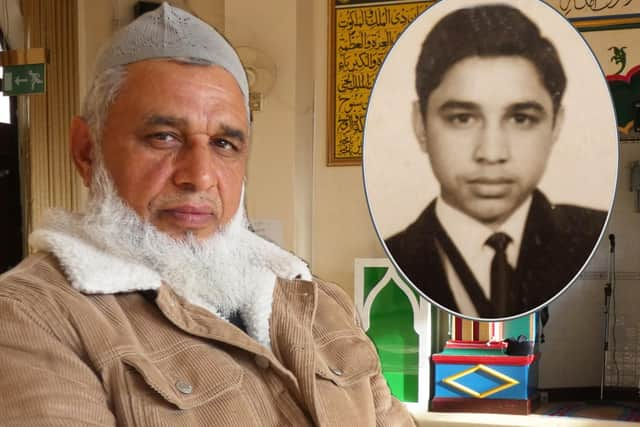Ravensthorpe Stories In A Suitcase: Mr. Ali comes to Dewsbury at the age of 11
and live on Freeview channel 276
He was part of a large group of Indian and Pakistani nationals who were encouraged to come and work in our local mills throughout the post-war decades of the 1960's and 1970's.
These men came to Britain because of a severe labour shortage existing during that period across the whole country.
Advertisement
Hide AdAdvertisement
Hide AdAs someone who now belongs to a dwindling generation, Mr Ali agreed to be interviewed for the Kirklees Faith Network's ‘Ravensthorpe Stories In A Suitcase Project’.


He talks in this feature about what his childhood life was like when he first arrived in Dewsbury. Speaking to the Reporter Series, Mr Ali said: "My grandfather Noor Alam was a 'Sephoy' (soldier) who had served in the British-Indian Army during the First World War.
“Because of that military heritage, his son - my father Ghulab Khan - had therefore been allowed to work in Dewsbury's mills since 1961. But my father decided to take a short holiday six years later - in 1967 - by going back to see the family in Pakistan. I came with him on his return flight to England in October 1967.
"I was only 11 years old when he brought me to Dewsbury on a coach
Advertisement
Hide AdAdvertisement
Hide Ad"I can remember we got into the town during the evening, and I was soon walking with my suitcase up the steps of a small terraced flat situated on Wakefield Road.
“The flat was one of several built near a narrow lane heading towards Chickenley. Once inside, I immediately went to bed feeling exhausted.
"I woke up next morning and looked out of the bedroom window like any curious child would do. All I saw outside through the glass was a thick misty smog. The scene was so bleak I wondered where I had come to!
“It was a big contrast to the sunshine I had enjoyed in Pakistan.
Advertisement
Hide AdAdvertisement
Hide Ad"My father went back to work - immediately after his return to Dewsbury - on the long shifts which were common in our mills during that period. I was obviously too young to work. The working age was 15 at that time.
“By law, I had to attend school for a few years. But I needed to wait until the local authority could allocate a place for me somewhere.
"The waiting time turned out to be the most dreadful experience of my entire childhood. The agonising wait continued for months.
"I had to stay at home during these months especially between the days of Monday to Friday with instructions to keep the door locked. I was new to the area, and my father rightly felt worried like any parent in his situation that I may end up getting lost even if I tried going out alone for a few minutes to the local corner shop.
Advertisement
Hide AdAdvertisement
Hide Ad"I suppose my father had his reasons to feel worried. Young Pakistani lads like me were vulnerable to racial assaults in those years.
"I could not however resist the temptation one day and I decided to go outside for a walk not far from the flat. But two concerned policemen walking on the same pavement suddenly approached me and asked why I was not at school? I did not understand their English, yet I was able to gesture towards where I lived! They followed me home.
"Both constables only left the flat after my father had assured them that I was waiting to be given a school place. The whole experience was frightening, but I had learned a valuable lesson.
"We only had a black and white television with a blurry picture quality. So, I had to occupy my time during those first several months staring at the wallpaper in our flat or looking at the burning coal fire. I could do nothing else to cope with the hours and hours of boredom.
Advertisement
Hide AdAdvertisement
Hide Ad"I always looked forward to getting some fresh air on Saturday when my father would take me to Dewsbury market - assuming he did not have any overtime booked at the mill. Otherwise I had to stay inside.
"This is what life in post-war Dewsbury was like for most Pakistani children of my generation who came to England during the 1960's. The vast majority of us had to be mentally strong anyway to separate from our mothers and to leave them behind in Pakistan.
“But for me, I also had to learn some important life skills in these lonely months such as washing my own clothes, cleaning the charred dusty fireplace, and preparing my own food during the day.
"There were no gas fires or electrical heaters in those years. So I had to bring in a shovel of coal from an outside shed.
Advertisement
Hide AdAdvertisement
Hide Ad"Besides the coal, nothing else kept the rooms warm. The wintery chill was so bitter in our flat I can remember my father and I having to crouch next to the fireplace on most evenings' just to warm our hands. Central heating did not exist in that era.
"I lived through a very tough time during those first few months until a letter from the local education board arrived one day. To my immense relief, the education authority had at last found a place for me at a school on Beckett Street in Batley-Carr."